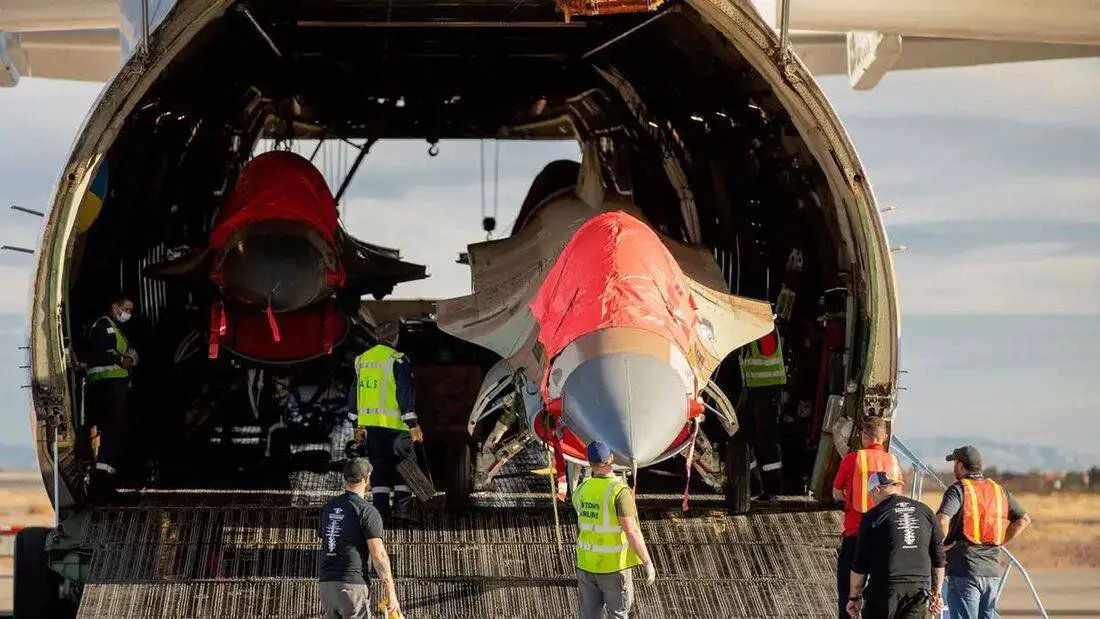this post was submitted on 02 Aug 2024
235 points (98.4% liked)
Ukraine
8356 readers
777 users here now
News and discussion related to Ukraine
*Sympathy for enemy combatants is prohibited.
*No content depicting extreme violence or gore.
*Posts containing combat footage should include [Combat] in title
*Combat videos containing any footage of a visible human must be flagged NSFW
Server Rules
- Remember the human! (no harassment, threats, etc.)
- No racism or other discrimination
- No Nazis, QAnon or similar
- No porn
- No ads or spam (includes charities)
- No content against Finnish law
Donate to support Ukraine's Defense
Donate to support Humanitarian Aid
founded 2 years ago
MODERATORS
you are viewing a single comment's thread
view the rest of the comments
view the rest of the comments




I'm delighted we're sending these over to Ukraine (though it should have been done a long time ago).
Question: the F-16s are planes. Is there some reason we're loading them onto other planes for transport instead of flying them over?
Ease of transfer (one pilot vs multiple for a looooong flight, probably no refuel on the Antonow, and if so it eats less specialised stuff than the F-16s) and maybe even fuel efficiency, I would guess.
Also, one cargo plane raises less eye brows than a flock of fighters.
AN-124’s are extremely inefficient - it’s probably stopping 2-3 times on route, but still easier to arrange than flying each plane.
Think they'd go west over the pacific or back across the US?
Back across the US - Portland Maine is a popular tech stop for the AN124’s and then probably someplace in the UK
Both aircraft types will almost certainly be running Jet A1, or whatever the military version of it is.
Same reason new cars aren't driven from the port to the dealership.
The others here answered everything already, I just would like to use one analogy: 6 sports cars on a trailer.
The maximum range for the F16 in "ferry" mode (max fuel, no weapons, pee before takeoff) is something like 4000km. The distance from Belfast (Maine) to Belfast (the original) is 4500km.
That would mean air to air refueling, which is expensive and risky. It would put major wear on the planes, which are not the newest to start with. And unlike the Antonov, the F16 comes with neither legroom nor bathrooms.
Iirc the factor that limited early nuclear submarines the most from continuous dives was the toilets, they have limited storage for sewage and it turns out that draining those with a greater outside pressure is a pretty difficult task, at least if you want to stay undetected.
Now that they have figured that out the limiting factor is food.
You didn't explain how they sorted it out so I'm assuming compost toilets or some form of slow torpedo that makes it look like the sub is pooing.
torpoodo
But at maximum speed, it could in theory cover the 4500km in just over 2h (but probably with worse fuel economy and less range)
There's no way it can get anywhere near that range at full speed. Fighters need to use afterburners to get up to max speed, and F16s run out of fuel in about 10 minutes when using afterburner.
Sourly 6 hours flight time is not significant wear.
It does mean significant operational downtime: https://www.technology.org/2023/01/02/did-you-know-f-16-fighting-falcon-needs-17-hours-of-maintenance-for-every-hour-of-flight/
You might be misunderstanding that statistic.
That's something like, this Squadron had n hours flight time and consumed n*17 hours maintenance.
That doesn't mean a 1 hour flight increases required maintenance by 17 hours.
It's safer for long distances, plus they won't have to worry about refueling.
That, and 6x the flight hours for a F16 is expensive. The flight hours with accompanied wear and tear are better used over Ukraine.